One of the hardest to reach and least populated islands in Britain is also home to a well-known whisky distillery. But life in Jura is about more than just whisky. The remoteness attracts an intriguing mix of people with more than their fair share of stories to tell.
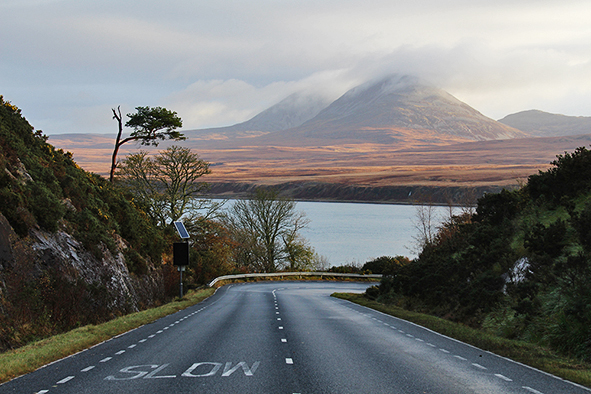
The Paps of Jura as seen from Islay (Photo: Paul Stafford)
On the Hebridean island of Jura, the weather can be rather punishing. All along the west coast of Scotland, storms and rain seem to take up residence like migratory birds. Jura is especially exposed; head west and there is nothing but untameable Atlantic for roughly two thousand miles. During times like this, whisky makes more sense than ever.
With the mechanisation of the whisky-making process, fewer people than ever are needed to run the distillery. Although in operation round the clock, outside of summer months the unpredictable weather leaves Jura cut off, as choppy seas and high winds cause cancellations to ferries from neighbouring Islay. During these months everything seems much quieter in and around the distillery.
The ferry I had taken across from Islay had stumbled over the surf like a lecherous drunk. Only one minute in, a seemingly small wave was enough to broadside the ferry –capacity: three cars – and throw me up against an iron railing. “You might want to take a seat” said the skipper grinning, as he piloted the vessel with practiced expertise.
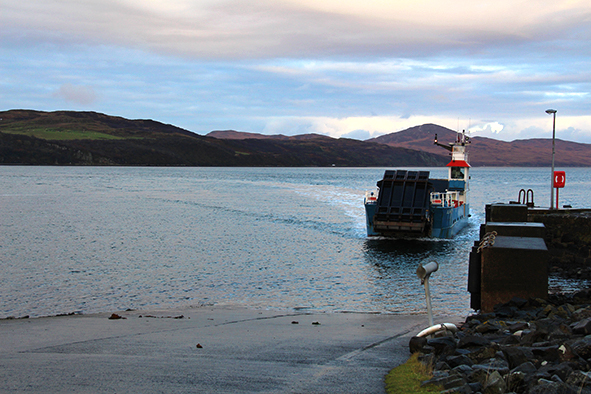
Ferry crossing at dawn (Photo: Paul Stafford)
A Lonely Island
I rubbed my bruising arm as we landed on the auburn husk of the island. The fading year lends confident colours to the land, at once hostile and beguiling. Despite the tiny population of Jura, public transport was exemplary, like everywhere in Scotland. A small minibus was waiting at the Feolin pier to take foot passengers onward.
A middle-aged man with salt and pepper hair pointed out a brace of deer, wandering down to the sea shore. A little further along the road a young stag munched at a piece of seaweed. “They love coming down of a late afternoon and eating the stuff at this time of year,” he said.
Despite the island’s diminutive human population, there are more than 5000 deer. During the autumn months their auburn coats camouflage seamlessly against the dying bracken that carpets most of the island. Patches of trees are scant, protected from the deer by high fences.
I confessed that I was hoping to climb the Paps of Jura if the weather would allow. “I might join you, are you going tomorrow?” he asked. That was the plan. “Well I’ll meet you in the pub later and we can talk more about it. You can’t miss it, it’s the only pub on the island.” I was dropped at the front door; as the minibus was trundling off I realised I hadn’t asked his name.
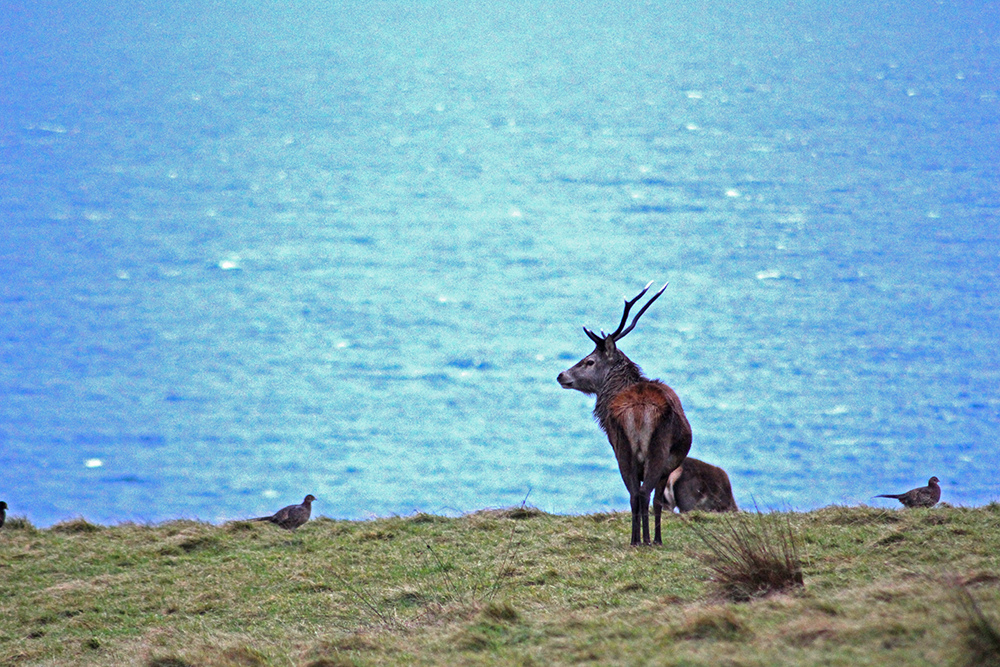
A deer heading down to the sea at dinner time (Photo: Paul Stafford)
Folk Point
Craighouse was actually more like a long preponderance of buildings strung out along the shore, with a huge whisky distillery in their midst. I wandered down to the sea. A thin concrete pier jutted out, providing a connection to land for two small boats, one of which looked decidedly worse for wear.
I’d first heard of Jura because of the Jura whisky on sale in my local Co-op in London. Big ambition for such a small place. I was hoping to have a look around the distillery, across from which was the Jura Hotel; the only one on the island. Palm trees outside suggested that there was either a healthy sense of optimism or a wry sense of humour that operated there. When I arrived I was greeted with an English accent, so I figured it was more likely the latter.
The barman that evening was also English. I was hoping to meet some locals – the distillery seemed operational but deserted – but only found other outsiders and a pair of travellers who’d come in from Glasgow. Although the bar was the place on the island to socialise, it began to seem as though nobody was actually from Jura.
“We’ve been coming here every year for a decade now, just to get away from everything,” Peter said, in between frustrated shouts at the grainy TV screen depicting his football team Celtic struggling in a Champion’s League match.

Boats do better out of the sea than on it during the winter months (Photo: Paul Stafford)
A Site for Stories
Encouraged, I bought another pint. At the bar a young guy with a thick goatee that made him look a decade older methodically rolled a cigarette. He called himself Matt, and that may indeed have been his real name, but for somebody to do what he had done – buy a boat in London and just sail, with little-to-no training, knowhow or destination – it wouldn’t be a surprise if he chose a new identity to go along with it.
“I almost died up near Findhorn. The storm was just relentless and had me pushed up against these rocks. That’s why I’m happy to stay here for a while. Take a break.” The tinny little vessel I’d seen moored up earlier was his. He lived there, ate there, bathed there and drank in the pub. “I’m a carpenter by trade, so I can do odd jobs and make some money off that,” he said, by way of making a living.
While other people came to Scotland to retire or relax, he was here to push himself. “I plan to cross the Atlantic in this next,” he said, somewhat nonchalantly.
“You’ll never make it in that thing,” said Andrea, who had started her shift at the bar. She was also English, from London, by way of Spain, where she had met her girlfriend. They had come this far in their campervan. “Not sure where we can go after this, but we like the peace here.” Perhaps Jura was the furthest people could get from society without going into the wild, I wondered.
Matt shrugged a ‘maybe’ and heaved himself off his barstool for a smoke. Andrea leaned in conspiratorially. “He almost died in that tiny thing once, and that was close to shore. He’ll never make it out there on the open ocean. He probably couldn’t even fit enough food for the journey in it.”
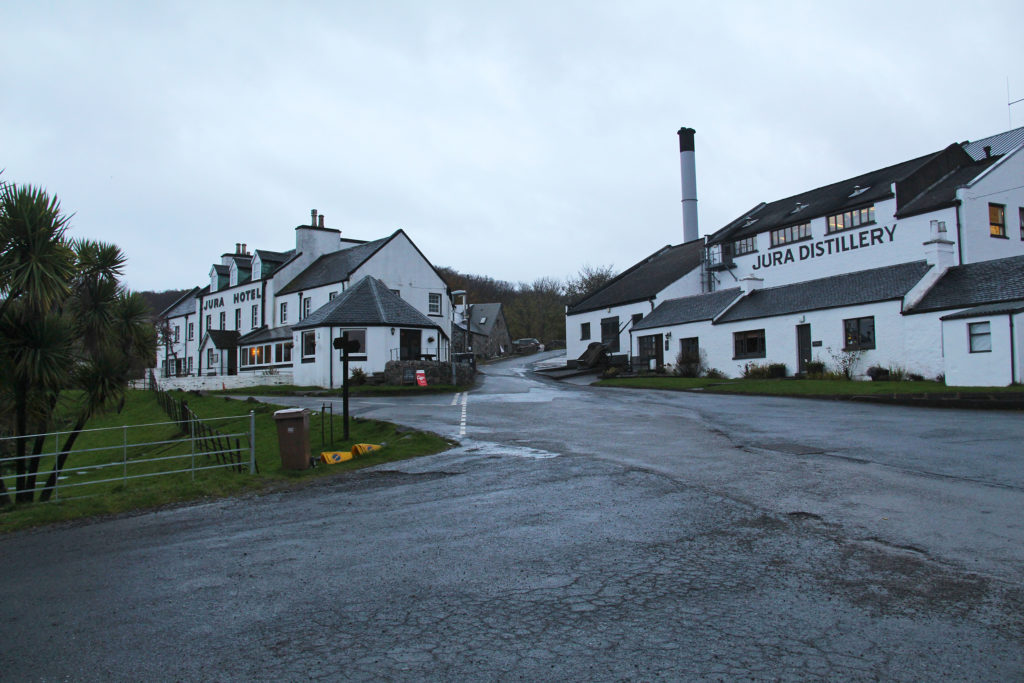
Jura Distillery and Hotel with palm trees (Photo: Paul Stafford)
Peter beckoned me over to a table and introduced me to his friends who were Jura natives. Alastair and his wife Rosie were a gregarious, energetic couple who brightened the atmosphere. “When we got married we made national news,” he said proudly. Rosie grinned at him. I wondered how many times they’d told this story.
“We were the first couple in a generation to get married here who were both born and raised on the island. Most folk leave and don’t come back.” He put a beefy arm around Rosie and we toasted their happiness. To see two people content to be exactly where they had always been, surrounded by glum people searching for something else in this remote corner was especially moving.
Money to Burn
The man from the minibus never showed up that evening. The only other patrons were a sizable group of Irish labourers who had been engaged in building a golf course for Greg Coffey, a hedge fund manager, who had recently bought Ardfin Estate on the island. It would later transpire that this estate was once accessible as a public garden until he came along. It was ironically the same spot where electronic band The KLF burned £1 million in August 1994, seemingly for no clear reason, but which provoked a serious discussion in the press of the responsibilities of those with money.
Clearly that debate has been forgotten, as another elite golf resort that nobody actually needs is now being built. “He once flew in to inspect a kitchen they’d put in,” a local driver told me. “He took one look, saw a small scratch and ordered the builders to start again. Fifty grand thrown away, like that.” After that I couldn’t stomach asking any more questions about him. “Would it at least create lots of local jobs?” I asked. “Well look at the labourers. Not one is local, is he?”
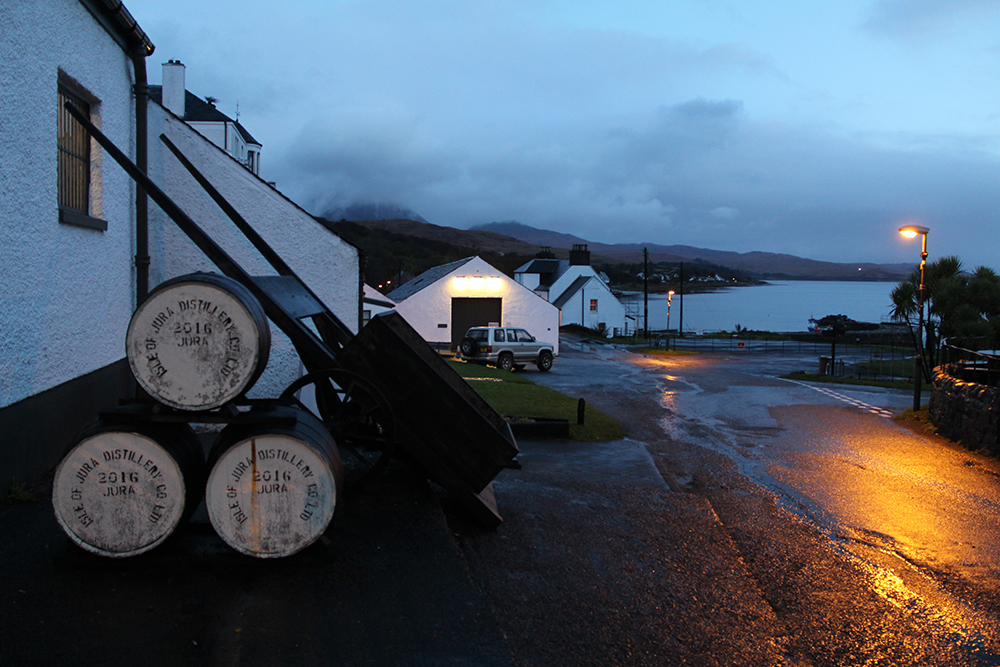
Kegs in Jura Distillery at dawn (Photo: Paul Stafford)
Long Journey
Alastair worked at the distillery and after a few rounds he invited me to come over and meet him at work the next day. I wondered if he would make it to his shift in six hours as we ordered another dram of whisky. “Oh yea, no problem, it’s just across the road from my house.”
Jura have names for their whiskies that befit the wild, haunting aspect of the island in winter. Names like Superstition and Prophecy. I took a Turas Mara, which means long journey, and raised the glass to Matt.
The next morning the tendrils of Jura whisky still probed at my temples. I pulled on some clothes and headed to the distillery. There was no obvious main office, but every room I checked was empty. The machinery whirred, the steam emanated, the mash tuns mashed, but there was not a soul to be seen. I suddenly felt like a trespasser. Even inside the distillery things felt remote.
Back outside, the town was quiet. It began to drizzle; grey misery crept over the infamous Paps, and sidled down towards the sea. The hike wasn’t going to happen, and so I set about returning to the ferry, before I became just another traveller entrenched on Jura, drunk on the serenity and concocting dangerous sea voyages to somewhere even more remote.